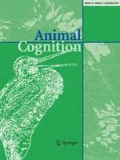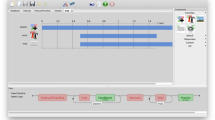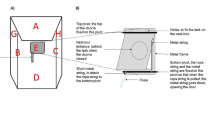Abstract
The present study aimed to investigate if the white-eared opossum under natural conditions is capable of spontaneously solving the parallel string task. The experimental study with this primitive mammal was carried out on fifteen naïve animals of both sexes in northeastern Brazil. The parallel strings task was arranged in apparatuses with a vertical and a horizontal arrangement. A food reward (a slice of banana) was connected at the extremity of one string. A total of 505 videos were recorded using trap cameras. Despite the observed interest in obtaining the bait, the number of attempts to reach it and the use of the strings as support (trying to directly reach the bait in the vertical apparatus), the individuals were unable to pull any of the strings, suggesting that they could not understand the problem. The present study points to the relevance of using the species Didelphis albiventris and other species from this family (e.g., D. virginiana) to broaden our knowledge about the cognitive capacity of mammalian species. In addition, the opossums might represent an advisable path to better understand the evolution of cognition in this group.





Similar content being viewed by others
References
Ashton BJ, Thornton A, Ridley AR (2018) An intraspecific appraisal of the social intelligence hypothesis. Philos Trans R Soc Lond B Biol Sci 373:1756. https://doi.org/10.1098/rstb.2017.0288
Ayres M, JrM Ayres, Ayres DL, Santos AAS (2007) Bioestat 5.3 aplicações estatísticas nas áreas das ciências biológicas e médicas. Belém, IDSM, p 364
Bray EE, Sammel MD, Seyfarth RM, Serpell JA, Cheney DL (2017) Temperament and problem solving in a population of adolescent guide dogs. Anim Cogn 20:923–939
Belov K, Harrison GA, Rosenberg GH, Miller RD, Cooper DW (1999) Isolation and comparison of the IgM heavy chain constant regions from Australian (Trichosurus vulpecula) and American (Monodelphis domestica) marsupials. Develop Comp Immun 23:649–656
Brotcorne F, Holzner A, Jorge-Sales L, Gunst N, Hambuckers A, Wandia IN, Leca JB (2019) Social influence on the expression of robbing and bartering behaviours in Balinese long-tailed macaques. Anim Cogn 23:311–326
Caceres R, Duffield N, Feldmann A, Friedmann JD, Greenberg A, Greer R, Mishra PP, Ramakrishnan KK, Rexford J, True F, van der Merwe JE (2000) Measurement and analysis of IP network usage and behavior. IEEE Comm Mag 38:144–151
Cáceres NC, Monteiro-Filho ELA (2001) Food habits, home range and activity of Didelphis aurita (Mammalia, Marsupialia) in a forest fragment of southern Brazil. Stud Neotrop Fauna Environ 36:85–92
Cáceres NC (2002) Food habits and seed dispersal by the white-eared Opossum, Didelphis albiventris, in Southern Brazil. Stud Neot Fauna E 37:97–104
Carusi LCP, Farace MI, Ribicich MM, Gómez Villafañe IE (2009) Reproduction and parasitology of Didelphis albiventris (Didelphimorphia) in an agroecosystem landscape in central Argentina. Mammalia 73:89–97. https://doi.org/10.1515/MAMM.2009.033
Caselli CB, Mennill DJ, Gestich CC, Setz EZF, Bicca-Marques JC (2015) Playback responses of socially monogamous black-fronted titi monkeys to simulated solitary and paired intruders. Amer J Prim 77:1135–1142
Collett TS, Collett M (2002) Memory use in insect visual navigation. Nat Rev Neurosci 3:542–552. https://doi.org/10.1038/nrn872
Dalloz MF, Loretto D, Papi B et al (2012) Positional behaviour and tail use by the bare-tailed woolly opossum Caluromys philander (Didelphimorphia, Didelphidae). Mamm Biol 77:307–313. https://doi.org/10.1016/j.mambio.2012.03.001
Dooley JC, Franca JG, Seelke AMH, Cooke DF, Krubitzer LA (2013) A connection to the past: Monodelphis domestica provides insight into the organization and connectivity of the brains of early mammals. J Comp Neurol 521:3877–3897. https://doi.org/10.1002/cne.23383
Emmons LH, Gentry AH (1983) Tropical forest structure and the distribution of gliding and prehensile-tailed vertebrates. Am Nat 121:513–524. https://doi.org/10.1086/284079
Field A (2005) Discovering statistics using SPSS, 2nd edn. Sage Publications, London
Finch G (1941) The solution of patterned string problems by chimpanzees. J Comp Psychol 32:83–90. https://doi.org/10.1037/h0056785
Gordon K (1938) Observations on the behavior of Callospermophilus and Eutamias. J Mam 19:78–84
Halsey LG, Bezerra BM, Souto AS (2006) Can wild common marmosets (Callithrix jacchus) solve the parallel strings task? Anim Cogn 9:229–233. https://doi.org/10.1007/s10071-006-0016-9
Humphrey NK (1976) The social function of intellect. In: Ra Hinde (ed) Bateson PPG. Growing points in ethology. Cambridge University Press, Cambridge, pp 303–317
Irie-Sugimoto N, Kobayashi T, Sato T, Hasegawa T (2008) Evidence of means-end behavior in Asian elephants (Elephas maximus). Anim Cogn 11:359–365. https://doi.org/10.1007/s10071-007-0126-z
Iwaniuk AN, Nelson JE, Whishaw IQ (2000) The relationships between brain regions and forelimb dexterity in marsupials (Marsupialia): a comparative test of the principle of proper mass. Aust J Zool 48:99–110. https://doi.org/10.1071/ZO99043
Jacobs IF, Osvath M (2015) The string-pulling paradigm in comparative psychology. J Comp Psych 129:89–120
James WT, Turner WW (1963) Experimental study of maze learning in young opossums. Psych Rep 13:921–922
Jerison HJ (1985) Animal intelligence as encephalization. Philos Trans R Soc Lond B Biol Sci 308:21–35. https://doi.org/10.1098/rstb.1985.0007
Jones ME (2003) Convergence in ecomorphology and guild structure among marsupial and placental carnivores. In: Jones M, Dickman C, Archer M (eds) Predators with pouches: the biology of carnivorous marsupials. CSIRO Publishing, Collingwood, pp 285–296
Laidre ME (2008) Spontaneous performance of wild baboons on three novel food-access puzzles. Anim Cog 11:223–230
Laidler K (1978) Aspects of physical and cognitive development in the infant orang-utan (Pongo pygmaeus) during the first fifteen months of life (Doctoral dissertation). Durham University, Durham
Luo ZX, Ji Q, Wible JR, Yuan CX (2003) An Early Cretaceous Tribosphenic mammal and Metatherian evolution. Science 302:1934–1940. https://doi.org/10.1126/science.1090718
Kaas JH (2011) Reconstructing the areal organization of the neocortex of the first mammals. Brain Behav Evol 78:7–21. https://doi.org/10.1159/000327316
Kaas JH (2013) The evolution of brains from early mammals to humans. Wiley Interdiscip Rev Cogn Sci 4:33–45. https://doi.org/10.1002/wcs.1206
Karlen SJ, Krubitzer L (2007) The functional and anatomical organization of marsupial neocortex: evidence for parallel evolution across mammals. Prog Neurobiol 82:122–141. https://doi.org/10.1016/j.pneurobio.2007.03.003
Köhler W (1927) The mentality of apes. London, Routledge & Kegan Paul. https://doi.org/10.1037/11338-000
Krasheninnikova A, Bräger S, Wanker R (2013) Means-end comprehension in four parrot species: Explained by social complexity. Anim Cogn 16:755–764. https://doi.org/10.1007/s10071-013-0609-z
Krause WJ, Krause WA (2006) The opossum: its amazing story. Department of Pathology and Anatomical Sciences, Missouri
Kruglanski AW, Fishbach A, Woolley K et al (2018) A structural model of intrinsic motivation: on the psychology of means-ends fusion. Psychol Rev 125:165–182. https://doi.org/10.1037/rev0000095
Martin P, Bateson P (1993) Measuring behaviour: an introductory guide. Cambridge University Press, Cambridge
Michels KM, Pustek JJ, Johnson JI (1961) The solution of patterned-strings problems by raccoons. J Comp Physiol Psychol 54:439–441. https://doi.org/10.1037/h0043615
Miller EK (2000) The prefontral cortex and cognitive control. Nat Rev Neurosci 1:59–65. https://doi.org/10.1038/35036228
Merkle JA, Fortin D, Morales JM (2014) A memory-based foraging tactic reveals an adaptive mechanism for restricted space use. Ecol Lett 17:924–931. https://doi.org/10.1111/ele.12294
Merkle JA, Monteith KL, Aikens EO et al (2016) Large herbivores surf waves of green-up during spring. Proc R Soc B Biol Sci 283:1–8. https://doi.org/10.1098/rspb.2016.0456
Moraes BLC, Souto AS, Schiel N (2014) Adaptability in stone tool use by wild capuchin monkeys (Sapajus libidinosus). Am J Primatol 76:967–977. https://doi.org/10.1002/ajp.22286
Oliveira ME, Santori RT (1999) Predatory behavior of the opossum Didelphis albiventris on the Pitviper Bothrops jararaca. Stud Neotrop Fauna Environm 34:72–75
Osthaus B, Lea SEG, Slater AM (2005) Dogs (Canis lupus familiaris) fail to show understanding of means-end connections in a string-pulling task. Anim Cogn 8:37–47. https://doi.org/10.1007/s10071-004-0230-2
Pepperberg IM (2004) “Insightful” string-pulling in Grey parrots (Psittacus erithacus) is affected by vocal competence. Anim Cogn 7:263–266. https://doi.org/10.1007/s10071-004-0218-y
Rademaker V, Cerqueira R (2006) Variation in the latitudinal reproductive patterns of the genus Didelphis (Didelphimorphia: Didelphidae). Austral Ecol 31:337–342. https://doi.org/10.1111/j.1442-9993.2006.01562.x
Range F, Möslinger H, Virányi Z (2012) Domestication has not affected the understanding of means-end connections in dogs. Anim Cogn 15:597–607. https://doi.org/10.1007/s10071-012-0488-8
Riesen AH, Greenberg B, Granston AS, Fantz RL (1953) Solutions of patterned string problems by young gorillas. J Comp Physiol Psychol 46:19–22. https://doi.org/10.1037/h0057069
Rodal MJN, Sales MF, Da Silva MJ, Da Silva AG (2005) Flora de um brejo de altitude na escarpa oriental do planalto da Borborema, PE, Brasil. Acta Bot Brasilica 19:843–858. https://doi.org/10.1590/S0102-33062005000400020
Sanches VQA, Gomes MM de A, Passos F de C, Graciolli1 G, Ribas AC de A (2012) Home-range and space use by Didelphis albiventris (Lund 1840) (Marsupialia, Didelphidae) in Mutum Island, Paraná river Brazil. Biota Neotrop 12:50–55 10.1590/S1676-06032012000400004
Sandidge LL (1953) Food and dens of the opossum (Didelphis virginiana) in northeastern Kansas. Kansas Acad Sci 56:97–106. https://doi.org/10.1007/sl0869-007-9037-x
Sanz CM, Morgan DB (2007) Chimpanzee tool technology in the Goualougo Triangle, Republic of Congo. J Hum Evol 52:420–433. https://doi.org/10.1016/j.jhevol.2006.11.001
Schiel N, Souto A (2017) The common marmoset: an overview of its natural history, ecology and behavior. Dev Neurobiol 77:244–262. https://doi.org/10.1002/dneu.22458
Schmieder RE, Martus P, Klingbeil A (1996) Reversal of left ventricular hypertrophy in essential hypertension: a meta-analysis of randomized double-blind studies. Jama 275:1507–1513
Shepherd W (1910) Some mental processes of the rhesus monkey. Psycho Monog 12:i–61. https://doi.org/10.1037/h0093038
Shettleworth SJ (2010) Clever animals and killjoy explanations in comparative psychology. Trends Cogn Sci 14:477–481. https://doi.org/10.1016/j.tics.2010.07.002
Smith P (2007) White-Eared Opossum Didelphis albiventris (Lund, 1840). Fauna Paraguay Handbook Mammals Paraguay 1:1–19
Sol D (2009) Revisiting the cognitive buffer hypothesis for the evolution of large brains. Biol Lett 5:130–133
Springer MS, Kirsch JA, Case JA (1997) The chronicle of marsupial evolution. In: Givnish TJ, Sytsma KJ (eds) Molecular evolution and adaptive radiation. Cambridge University Press, Cambridge, pp 129–161
Vieira EM, de Camargo NF (2012) Uso do espaço vertical por marsupiais brasileiros. In: Cárceres NC (ed) Os marsupiais do Brasil: biologia, ecologia e conservação, 2nda edn. Editora UFMS, Campo Grande, pp 347–364
Volchan E, Domingues Vargas C, Da Franca JG et al (2004) Tooled for the task: vision in the opossum. BioScience 54:189–194. https://doi.org/10.1641/0006-3568(2004)054[0189:tfttvi]2.0.co;2
Weisbecker V, Goswami A (2010) Brain size, life history, and metabolism at the marsupial/placental dichotomy. Proc Nat Acad Scie 107:16216–16221
Weisbecker V, Beck RMD (2015) Marsupial and Monotreme evolution and biogeography. In: Klieve A, Hogan L, Johnston S, Murray P (eds) Marsupials and monotremes: nature's enigmatic mammals. Nova Science Publishers, New York, pp 1–32
Werdelin L (1986) Comparison of skull shape in marsupial and placental carnivores. Austr J Zoo 34:109–117
Whitt E, Douglas M, Osthaus B, Hocking I (2009) Domestic cats (Felis catus) do not show causal understanding in a string-pulling task. Anim Cogn 12:739–743. https://doi.org/10.1007/s10071-009-0228-x
Williamson TE, Brusatte SL, Wilson GP (2014) The origin and early evolution of metatherian mammals: the Cretaceous record. Zookeys 76:1–76. https://doi.org/10.3897/zookeys.465.8178
Acknowledgement
We thank the Santuário Ecológico de Pipa (Tibau do Sul) and the Refúgio Ecológico Charles Darwin (Igarassu) for authorizing data collection in their properties. To anonymous reviewers who effectively helped improving this manuscript. To Dr. Christini Caselli for the support in the statistical analysis. The research was funded by FACEPE (Fundação de Amparo à Ciência e Tecnologia de Pernambuco) Grant no. IBPG-0993-2.04/15 awarded to Tatiani Albert.
Author information
Authors and Affiliations
Contributions
TA collected data and wrote the paper. NS wrote the paper. AS conceived, designed the study and wrote the paper.
Corresponding author
Ethics declarations
Conflict of interest
There are no conflicts of interest. The manuscript has not been published previously and is not under consideration for publication elsewhere.
Animal welfare The study is in accordance with Brazilian norms and laws, and was approved by the Committee on Ethics in the Use of Animals (CEUA - Comitê de Ética no Uso de Animais) of the Universidade Federal Rural de Pernambuco (CEUA #113/2016).
Additional information
Publisher's Note
Springer Nature remains neutral with regard to jurisdictional claims in published maps and institutional affiliations.
Electronic supplementary material
Below is the link to the electronic supplementary material.
Supplementary file1 (AVI 16530 kb)
Rights and permissions
About this article
Cite this article
Albert, T.G., Schiel, N. & Souto, A. The white-eared opossum failed to understand the parallel strings task: studying a primitive mammal under natural conditions. Anim Cogn 23, 871–880 (2020). https://doi.org/10.1007/s10071-020-01392-1
Received:
Revised:
Accepted:
Published:
Issue Date:
DOI: https://doi.org/10.1007/s10071-020-01392-1




